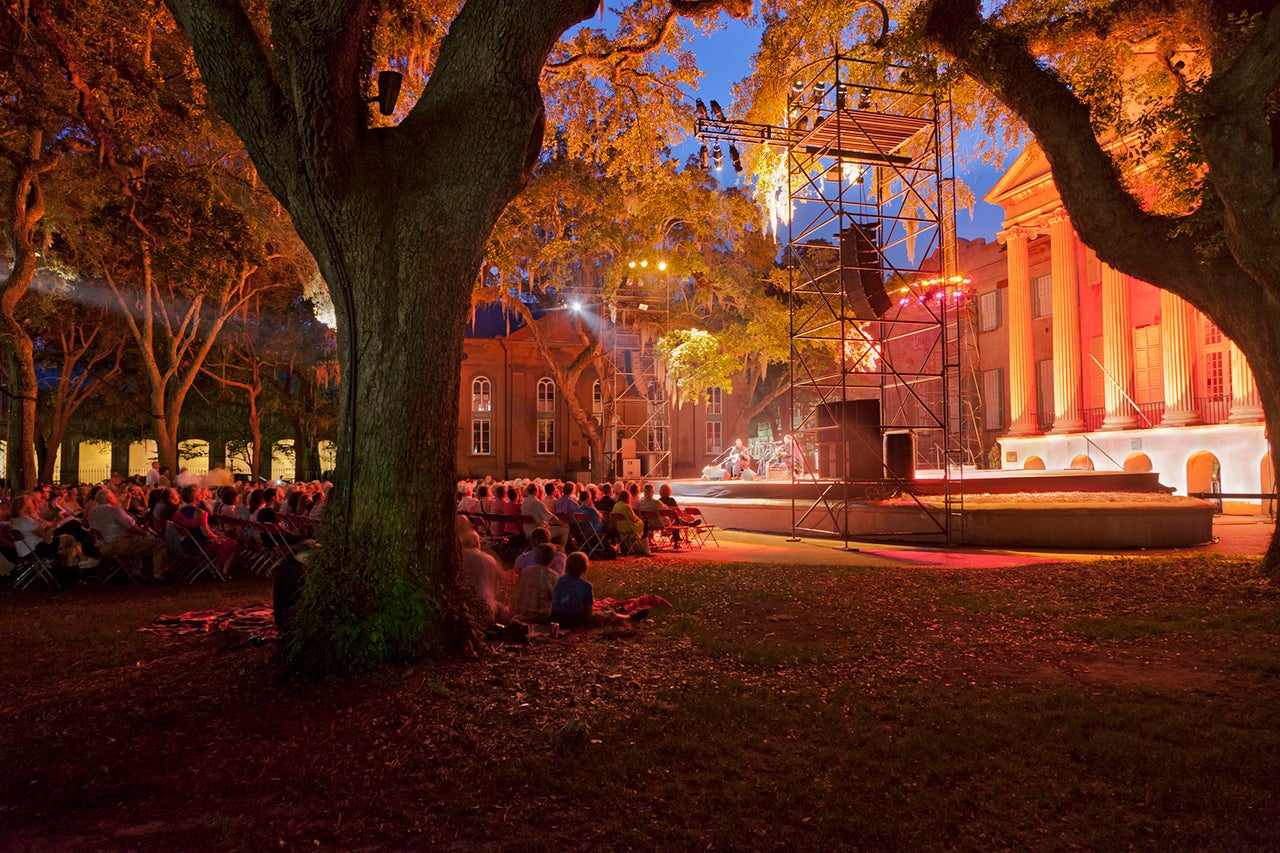After the rush of finals, things can get a little quiet around campus in May. But with around 100 Maymester sections of lecture or lab courses, there’s still plenty of opportunities for students to keep learning as the dog days of summer approach.
With special topics courses such as The Economics of Gambling, The Cold War, Political Film on Latin America, and All that Jazz: A Guided Tour of America’s Music, students can tackle engaging subjects in an immersive experience as part of the condensed, three-week Maymester format.
If you’re already missing the majestic oaks of the Cistern Yard, here are four Maymester classes worth sticking around for:

Charenee Wade and band performing in the College of Charleston Cistern Yard. (Photo: Julia Lynn Photography)
Spoleto: Music/Arts
You don’t need to be artistic to enjoy the arts. And what better way to take in all the sights and sounds of theater, opera, orchestra, dance and visual art than through Spoleto Festival USA, Charleston’s premiere international performing arts festival. This course gives students exclusive access to festival directors, opera singers, set designers, actors and musicians as guest lecturers.
This year, according to theatre professor Todd McNerney, students will receive discounted tickets to six performances, including jazz singer Dee Dee Bridgewater; Pyotr Tchaikovksy’s opera Eugene Onegin; Cuban jazz artist Pedrito Martinez and the Ireland-based Druid Theatre Company’s performance of Waiting for Godot.
Undoubtedly, this class is the ultimate introduction to the arts.
Oceanography
Charleston is certainly known as a coastal destination, but do you really know what’s in the ocean? Oceanography gives students an up-close look at the biodiversity of marine organisms living in our part of the Atlantic and an understanding of how the oceans work.
Students will make several trips to Charleston Harbor to do sampling of water and aquatic life. A three-hour cruise aboard the R/V Silver Crescent, as well as sampling from aboard smaller boats, offers students hands-on experience measuring various oceanographic parameters in the water column such as temperature, salinity, turbidity, light, oxygen, nutrients and chlorophyll from six different stations in the harbor, says biology professor Jack DiTullio. And an otter trawl along the harbor floor will give students a chance to examine creatures such as fish, shrimp, horseshoe crabs and other marine invertebrates.
This class is sure to be an adventure on the high seas.
Cannabis in History and Culture
In November of 2012, Colorado voters gave their blessing to allow the recreational use of marijuana in the Centennial state. Since then a national conversation has gripped the United States about the financial, medical, legal and cultural impacts of legalizing cannabis.
The course Cannabis in History and Culture offers students an academic platform from which to discuss the various forces that have influenced the use of or attitudes about the plant known as cannabis (legally called marijuana). Taking into consideration the impacts of economics, geography, generation, nationality, race, religion and culture, students examine cannabis in terms of production, trade, use and the debates surrounding the substance, says associate professor of history Tim Carmichael.
This isn’t a discussion about the legalization of marijuana, Carmichael says, but rather an interrogation of the relationships between economics, politics, consumption, and social and legal attitudes toward the plant throughout history and in varied societies around the world.
Horror Films and 20th Century America
Franklin D. Roosevelt famously said, “The only thing we have to fear is fear itself.” But what we find frightening can change over time amid the ever-evolving backdrop of social mores, technology and politics.
Students will contemplate the historical context for horror films of the 20th century in this frightfully entertaining class. What did audiences find frightening about Universal Pictures’ 1931 film Frankenstein, given that most don’t find it all that scary today? Did Jaws help Americans forget about the Vietnam War when it came out in 1975? Would Get Out have been so popular if it hadn’t come out amid the Black Lives Matter movement?
History professor Scott Poole wants students to think critically about what American horror films reveal about key cultural events, ideologies and moral panics within our national narrative.
Feature photo by Julia Lynn Photography.







